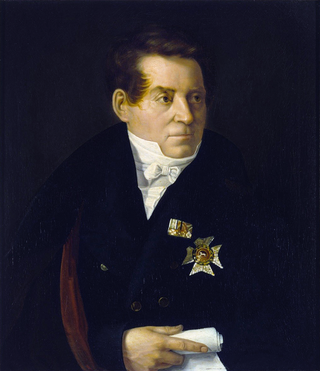
Johann Christian Friedrich Hölderlin was a German poet and philosopher. Described by Norbert von Hellingrath as "the most German of Germans", Hölderlin was a key figure of German Romanticism. Particularly due to his early association with and philosophical influence on Georg Wilhelm Friedrich Hegel and Friedrich Wilhelm Joseph Schelling, he was also an important thinker in the development of German Idealism.

German Romanticism was the dominant intellectual movement of German-speaking countries in the late 18th and early 19th centuries, influencing philosophy, aesthetics, literature, and criticism. Compared to English Romanticism, the German variety developed relatively early, and, in the opening years, coincided with Weimar Classicism (1772–1805).

August WilhelmSchlegel, usually cited as August Schlegel, was a German Indologist, poet, translator and critic, and with his brother Friedrich Schlegel the leading influence within Jena Romanticism. His translations of Shakespeare turned the English dramatist's works into German classics. Schlegel was also the professor of Sanskrit in Continental Europe and produced a translation of the Bhagavad Gita.

Karl Wilhelm FriedrichSchlegel was a German poet, literary critic, philosopher, philologist, and Indologist. With his older brother, August Wilhelm Schlegel, he was one of the main figures of Jena Romanticism.

The University of Jena, officially the Friedrich Schiller University Jena, is a public research university located in Jena, Thuringia, Germany.

Ludwig Ferdinand Huber or Louis Ferdinand Huber was a German translator, diplomat, playwright, literary critic, and journalist. Born in Paris, Huber was the son of the Bavarian-born writer and translator Michael Huber and his French wife Anna Louise, née l'Epine. He grew up bilingual in French and German after his parents moved to Leipzig when he was two years old. He lacked a classical education but read voraciously and was well versed in modern languages, and started publishing translations from French and English at an early age. He also translated plays that were performed in theatres all over Germany. In the early 1780s, Huber became friends with the jurist Christian Gottfried Körner, his fiancée Minna Stock, and her older sister Dora Stock, whom he later promised to marry. Together, the friends wrote in admiration to the poet Friedrich Schiller and successfully invited him to come to Leipzig. Körner and Minna were married in 1785 and lived in Dresden, where they were joined by Dora, Schiller, and finally Huber, who shared a house with Schiller.

Ernst August Friedrich Klingemann was a German writer. He is generally agreed to be the author of the 1804 novel Nachtwachen (Nightwatches) under the pseudonym Bonaventura.

Sulpiz Boiserée was a German art collector and art historian. With his brother Melchior he formed a collection that ultimately formed the basis of that of the Alte Pinakothek. He played a key role in the completion of Cologne Cathedral.
Pauline Gotter was the second wife of Friedrich Wilhelm Joseph Schelling and a friend of Louise Seidler and Sylvie von Cigars.

A Musen-Almanach was a kind of literary annual, popular in Germany from 1770 into the mid-19th century. They were modelled on the Almanach des Muses published in Paris from 1765.

Johann Bernhard Vermehren was an early Romantic poet and scholar.
Heinrich Doring, born Michael Johann Heinrich Döring was a German writer, theologian and mineralogist.

Georg Heinrich Ludwig Nicolovius was a senior Prussian ministerial official whose responsibilities primarily encompassed church and school affairs.
Johann Georg Rist was a Danish author, diplomat and statesman, originally from Holstein.

Joseph Schreyvogel was a Viennese writer and journalist. He also worked as a dramaturge.

Ernst August Hagen was a Prussian writer on art and novelist. He taught at Königsberg University and was the first Prussian scholar to hold a teaching chair in Art history and Aesthetics.
Georg Ludwig von Bar was a German "secular" canon ("Domherr"), writer and translator.
Karl Tomaschek was an Austrian literary historian, best known for his writings on Friedrich Schiller.

Paul Slevogt was a German philologist and Aristotelian philosopher.
Christian Johann Christoph Schreiber was a German theologian, philologist, philosopher, and poet. He was also the Superintendent of the dioceses of Lengsfeld and Dermbach. He was connected in friendship or correspondence to writers and philosophers of his time, and published poetry, sermons, historical and philosophical works.














